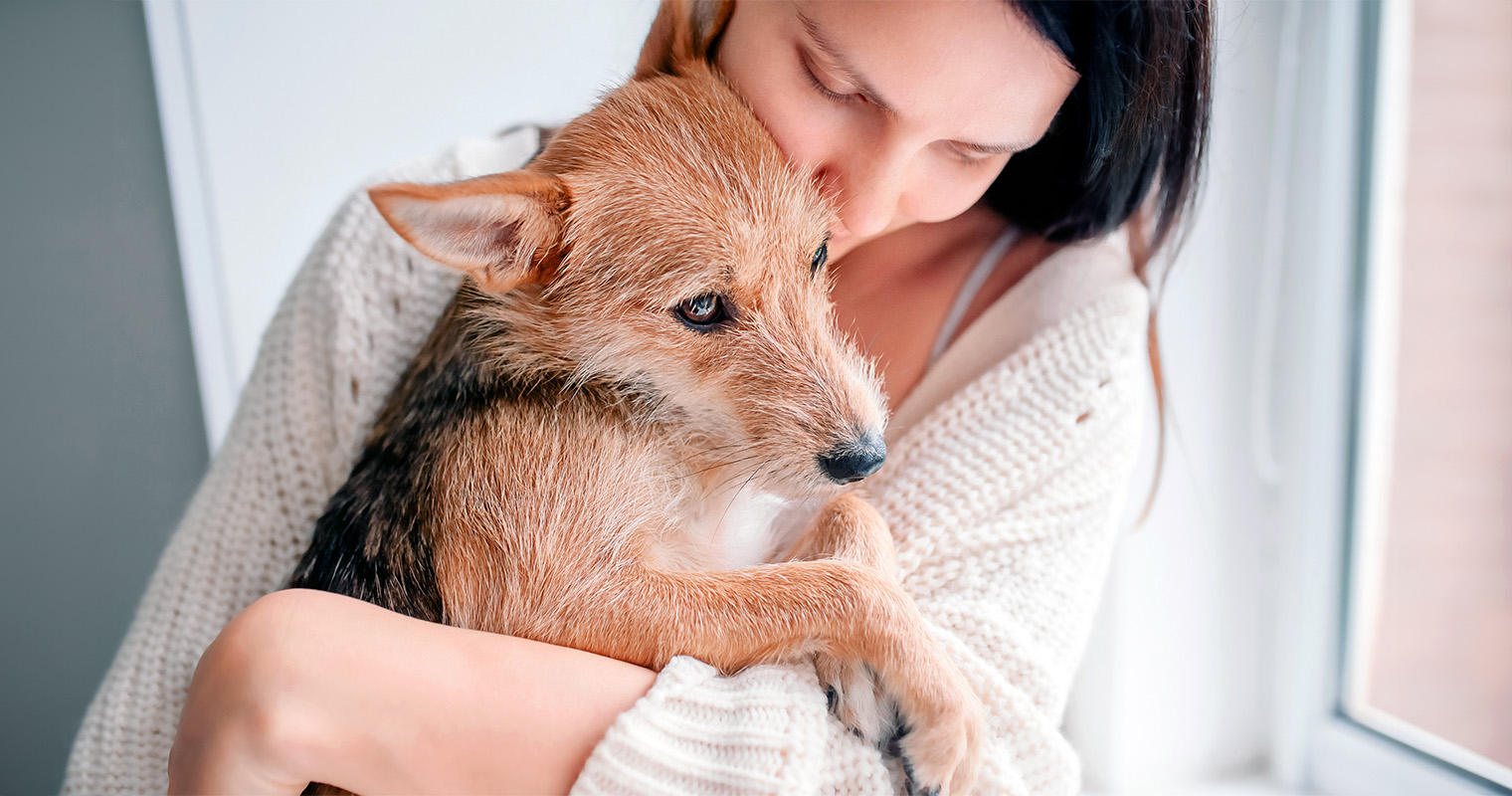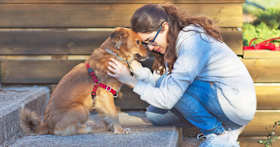How Do I Surrender My Irish Wolfhound?
There is a responsible, humane way to find them a new home. We walk you through those steps.
There is a responsible, humane way to find them a new home. We walk you through those steps.
by Mollie Jackman, | April 22, 2025

Ashva / iStock
When you first brought home your Irish Wolfhound, you probably imagined years of companionship — long walks, lazy afternoon snuggles, and a bond that would last a lifetime. But things haven’t gone the way you planned. Maybe your living situation has changed, and there’s no longer enough space for a giant breed. Perhaps the financial strain of feeding and caring for such a large dog has become overwhelming, and you’re looking for financial assistance with vet bills. Or despite your best efforts, their energy, strength, or prey drive feels like more than you can handle.
Whatever the reason, even thinking about Irish Wolfhound rehoming can make you feel guilty, worried, or unsure of what to do next. But here’s the truth: Sometimes, the best decision for both you and your dog is to find them a home that better suits their needs.

If you’ve done all you can, it’s important to remember that pets are individuals, and your home might not be the right fit. Rehome by Adopt a Pet for a safe way to rehome your pet.
Rehoming an Irish Wolfhound isn’t giving up — it’s making sure your dog has the life they deserve, even if that means living with another family. These gentle giants need space, structure, and specialized care that not every pet parent can provide.
This guide will walk you through how to rehome a dog, from exploring your options to finding the safest and most responsible way to transition your pup into a new home. Whether you need to surrender a dog immediately or want to take time to find the right match, you have options — and you’re not alone.
Rehoming a dog means finding them a new, responsible home when you can no longer care for them. This is different from surrendering a dog, which usually involves giving your dog to a shelter or rescue organization. When you rehome your Irish Wolfhound, you take an active role in ensuring they go to a safe, loving family rather than leaving that decision to an overcrowded shelter.
There are many reasons pet parents may need to make this choice. Maybe your Irish Wolfhound has grown too large for your current home, or you’re expanding the family and wondering if they fit among the best large dog breeds for families. Or financial struggles have made it difficult to afford their food and veterinary care. Perhaps they have high energy levels or behavior challenges that you aren’t quite equipped to manage.
The most important thing is to take the time to find the right option — not just any home, but the right home. If you’re unsure how to find the best adopter, check out these tips for finding a home for a rescue pet. In the next sections, we’ll explore how to rehome a dog fast, avoid risky rehoming methods, and connect with people who are truly prepared to welcome an Irish Wolfhound into their lives.
If you’ve decided to rehome your Irish Wolfhound, it’s important to do so in a way that prioritizes their well-being. Finding the right home takes time, but choosing the best option will ensure your dog ends up with a responsible adopter.
When it comes to rehoming your dog, there are several avenues to explore. Let’s walk through the safest and most effective ways to rehome your Irish Wolfhound.
It might be tempting to post an ad on Craigslist or social media to find a new home quickly, but these platforms are risky. If you can’t properly screen potential adopters, your dog could end up in an unsafe situation. Some people seek out large breeds like Irish Wolfhounds for irresponsible breeding, neglect, or even dog fighting.
Red flags to watch for in potential adopters:
Someone offering to take your dog “no questions asked“
Requests for a “free“ dog, which can indicate a lack of commitment or bad intentions
Adopters unwilling to meet in person or share details about their homes
People interested in adopting many dogs at once
It’s best to simply avoid online options, including pet classifieds, as they often attract adopters who may not have the best intentions.
One of the safest (and least stressful) ways to rehome a dog is to place them with someone you already know and trust. A family member, close friend, or coworker looking for a dog may make the perfect home. For someone who already knows your dog, the adjustment period for both your pup and the new parents may be easier.
If you want to stay involved in your dog’s adoption process, Rehome by Adopt a Pet is a great option. This online platform allows you to create a profile for your Irish Wolfhound (or any other pet), connect with and screen adopters, and choose the best fit for your dog.
How Rehome by Adopt a Pet works:
Create a profile: Include photos and a detailed description of your dog’s personality, needs, and history.
Set an adoption fee: Fees help ensure adopters are serious and responsible.
Screen potential adopters: Review applications and communicate with interested families.
Finalize the adoption: Once you find the right match, Rehome provides guidance on safely transitioning your dog into their new home.
Using a platform like Rehome ensures your dog is adopted by a responsible, committed pet parent rather than someone looking for a free pet or making an impulsive decision.
Surrendering your Irish Wolfhound to a shelter or rescue is another option. Many animal shelters accept surrendered pets, but they are severely overcrowded. Approaching a breed-specific rescue is a better bet, since they increase the chances of adoption. Reach out to your local shelter or rescue groups about their process to ensure the best results for your dog. Many shelters and rescues have waiting lists for intake, but they may be able to provide some resources to rehome a dog quickly in urgent situations.
Before surrendering your pup, research how to find a reputable pet rescue organization.
A rehoming fee is a small fee you charge someone to adopt your pet. If you know the adopters personally, you may not need to worry about a rehoming fee. But if you’re speaking with potential adopters you don’t know, a rehoming fee can be a good way to ensure the adopter is serious about the adoption, is committed to your dog, and has the best intentions.
In most cases, rehoming your Irish Wolfhound won’t cost you anything, but that depends on the method you choose. Some shelters charge surrender fees to cover the cost of caring for your pet until they are adopted. These fees typically range from $50 to $150, though some shelters offer reduced rates or financial assistance for pet parents in need.
But where can you surrender your dog for free? If you work with a breed-specific rescue or use an online rehoming platform, there’s often no fee. Many rescues operate through donations and volunteer efforts, so they may take in your dog at no cost, though space can be limited. If you’re worried about costs, this guide on rehoming fees explains when you might have to pay and why most rehoming options don’t require a fee.
If you choose to rehome your Irish Wolfhound yourself, platforms such as Rehome by Adopt a Pet allow you to list your dog for adoption at no charge. You can also set an adoption fee there, to ensure potential adopters are serious and responsible.
No matter which option you choose, taking the time to find a responsible new home is the most important part of the process. Rehoming your Irish Wolfhound is a deeply personal and often emotional decision, but that doesn’t make you a bad pet parent. Sometimes, loving your dog means recognizing when their needs have outgrown what you can provide.
There are a few ways you can surrender a dog immediately. First, avoid social media and pet classifieds, which can attract unsafe adopters. In contrast, breed-specific rescues and local animal shelters are two safe options. Space may be limited at either, so call ahead to check availability. A better option is to use Rehome by Adopt a Pet to match your dog with a screened adopter instead of surrendering them to a crowded shelter.
Surrender fees for dogs vary by shelter and rescue, and many have no fee. Other rescues and shelters may charge surrender fees. They include municipal animal shelters ($50 to $150) and no-kill shelters and rescues (100 to $300). Many breed-specific rescues do not charge surrender fees, but may have waitlists due to limited space. (Keep in mind that shelter space is often impacted by pet overpopulation, which affects resources and adoption rates.)
Yes, you can rehome your Irish Wolfhound for free, but it’s important to screen adopters carefully. Offering a pet for free can attract irresponsible or even dangerous owners. Setting a reasonable rehoming fee helps ensure potential adopters are serious and capable of providing proper care. If you prefer to rehome your dog without charging a fee, consider placing them with a trusted friend, family member, or breed-specific rescue.
If your Irish Wolfhound has shown aggression, it’s crucial to be transparent about their behavior when rehoming. If possible, work with a behavior specialist to determine if training can resolve the issue before considering rehoming them. Some rescues specialize in dogs with behavioral challenges, but never rehome a dog with a history of biting without full disclosure.
When creating an adoption profile, be as detailed as possible. A strong listing will include a dog’s age, weight, and personality traits, their medical conditions or special needs, energy levels, training history, and ideal home environment. You should also include clear photos showing their size and appearance.
“Common Surrender Reasons (Dogs).” MSPCA-Angell, 30 Apr. 2024, www.mspca.org/pet_resources/common-surrender-reasons-dogs.
“Health Info/Guarantee.” Norhunter Irish Wolfhounds, 2017, www.norhunteririshwolfhounds.com/health-infoguarantee.html.
“IWCA Irish Wolfhound Rescue - Irish Wolfhound Club of America, Inc.” Irish Wolfhound Club of America, Inc., 2025, www.iwclubofamerica.org/rescue.
“IWCC Rescue | IWCC • CCLI.” Iwcc.ca, 2025, iwcc.ca/fr/rescue-2.

Mollie Jackman is a writer, editor, and graduate of Lindenwood University’s MFA in writing. She’s also a pet parent to a goofy big-eared dog and two brown tabby cats, plus a rotating cast of foster animals. When she’s not reading, writing, or picking up strays, she can be found binge-watching arguably terrible reality TV shows and cooking competitions or rolling around the local skating rink in Columbia, Missouri. Mollie’s writing on this site is not in any way affiliated with the University of Missouri, or her work as a copywriter for MU Health Care.

Rehome

Rehome

Rehome

Breed Info
From temperament to care needs, here’s everything you need to know about these giant breeds.

Rehome
Do you need to give up your dog? Check out these options — they’re not only kinder for your pup, but they also boost the chances of a happy ending.

Behavior & Training
The road to getting your cat and dog to get along can be rough. Thankfully, there are easy steps you can take to make it way less rocky.

Behavior & Training
Is your new pup biting everything? Learn effective ways to curb this behavior by teaching bite inhibition.

Behavior & Training
Feeling overwhelmed by your very, very energetic dog? This comprehensive guide explores practical solutions to help calm your lively companion.

Behavior & Training
Set your new puppy up for success by creating house rules that establish boundaries and encourage good behavior.